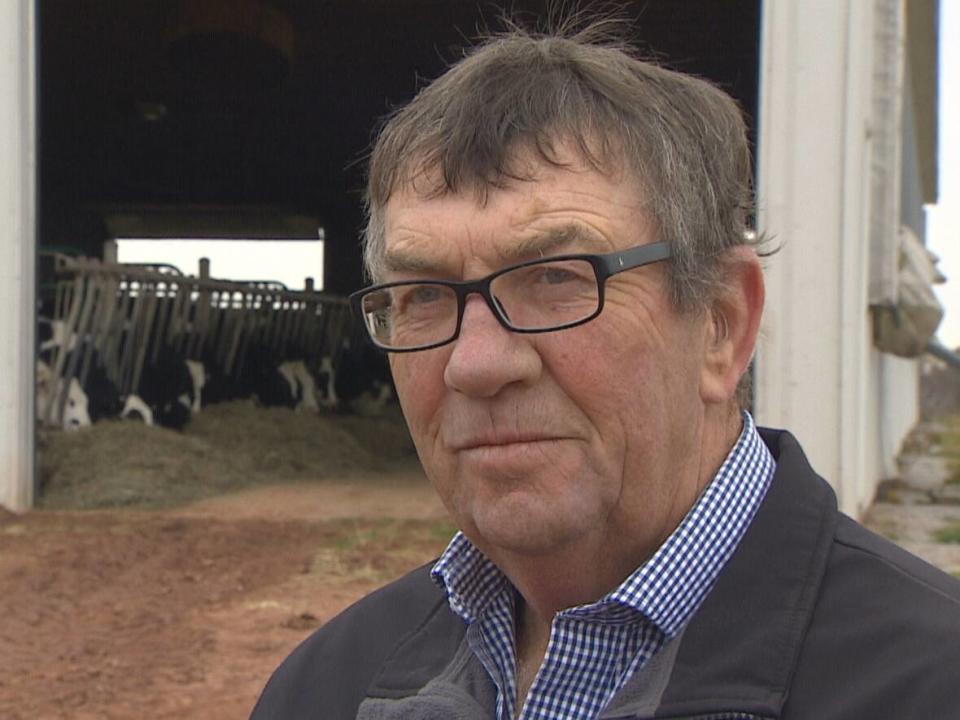P.E.I. dairy farmers say 2.5% price hike needed to make up for rising costs

Some Island farmers say a looming increase in the price of dairy products is necessary to make up for skyrocketing costs.
Dairy prices will be going up by 2.5 per cent starting Sept. 1 following an adjustment by the Canadian Dairy Commission.
The Crown corporation that oversees supply management in Canada usually adjusts prices once a year in February, but farmers had called for an increase in June to account for rapidly rising costs. That's in addition to the 8.4 per cent increase at the beginning of the year.
Gordon MacBeath is chairman of Dairy Farmers of P.E.I. He said the increase is necessary amid an "unprecedented" rise in the cost of doing business.
"We're standing in a barley field here and the cost of growing that crop has increased so significantly in the last [eight] months," he said.
"The cost of growing that crop, and fertilizer for it, for example, would have gone up from close to $600 a tonne to over $1,000 a tonne. The seed has gone up about 20 per cent — that's since the spring. Every component and every import cost has gone up. And, you know, so we have to cover that at some point somehow."

MacBeath said that since February's increase, Russia's invasion of Ukraine and other factors helped drive inflation — already on the rise due to supply chain issues — to record highs.
He said P.E.I. has about 160 producers, most of them small, family-run farms that get by with tiny profit margins.
"Every feed supply store and machinery dealer and hardware store in Charlottetown has to make a margin on what they produce and they pass that on to consumers," he said. "At some point, we have to pass those costs on or else it's not sustainable."
MacBeath said that 2.5 per cent increase only amounts to about two cents per litre of milk.
Dairy price increase 'puzzling' to food policy expert

But Sylvain Charlebois, director of the Agrifood Analytics Lab at Dalhousie University, is "puzzled" by the decision behind the increase.
Charlebois said data leaked from the Canadian Dairy Commission showed production costs actually went down by one per cent from 2020 to 2021, though early data suggests they're increasing.
The commission has said its decisions are based on data from two years previous, not 2021. But Charlebois previously told CBC News that would mean costs should had risen by two per cent earlier this year instead of 8.4 per cent because that was how much production costs went up by in 2020.
"If you follow the logic, CDC's logic, by Nov. 1 we should hear from the Crown claiming that for 2023 we should see a drop in farm milk prices, not an increase. But we're actually going in the opposite direction," Charlebois said.
Charlebois said the current pricing and quota system supports less efficient farms.
He said farm-gate dairy prices in Canada are 30 per cent higher than the rest of the world and that if prices continue to increase, that could lead more people to turn to plant-based milk alternatives, which are becoming cheaper.
"If you visit a farm in P.E.I. or Nova Scotia or New Brunswick, you're back in the '80s, really," he said.
"There's no incentive for farmers to really invest or modernize their equipment because they actually do get more money for their work. So they can basically continue to do on what they want to do without really thinking about the consumer or taxpayers. "
Charlebois said the retail price for butter went up by 24 per cent year-over-year in Canada. With the extra 2.5 per cent hike, he said that could translate to a seven to eight per cent mark-up in stores.

